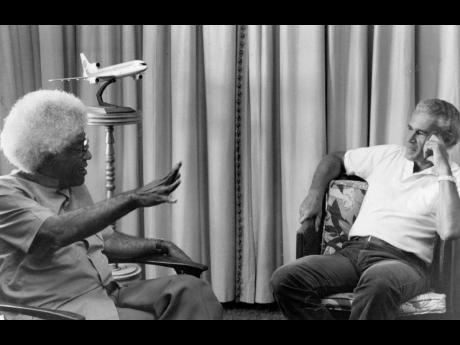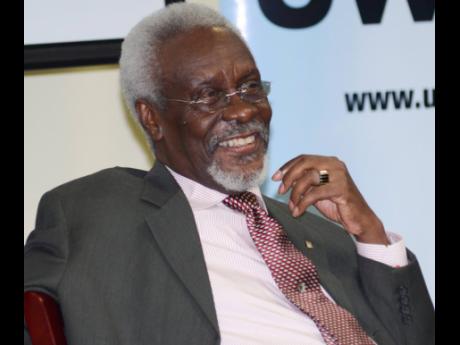P.J. Patterson | Lamming’s Caribbean voice and vision must live on
The entire Caribbean has been jolted by a loss of volcanic enormity with the muting of one of its most powerful voices: the death of novelist, poet, storyteller, and political advocate George Lamming.
True to form, George seemed to have written his final earthly statement by quietly passing from this world and missing the national, regional, and international celebration of his life by timing his death for three days before he reached his 95th year, as if that would have been too much for him.
It is difficult to explain and perhaps impossible for the generation of today to understand why for those of us who were students in the decades of the ‘50s George Lamming is such an epic and venerable figure. For us the publication In The Castle of My Skin is indelibly etched alongside Roger Bannister’s running of the first sub-four-minute mile and Yuri Gagarin’s first Sputnik voyage. These were life-changing experiences we will never forget.
As pupils in the most outstanding grammar schools, throughout the region, we had mastered the literature of England – its prose, poetry, drama, and novels. So, too, for the language specialists of Spanish and French, who were well read in the masterpieces of France and Spain. Those who pursued the Honours Degree in Literature were taught Anglo-Saxon at UCWI and Medieval English as well.
But there was no space for the creative output of our Caribbean writers. Dialect and creole were completely out of the question.
INDIGENOUS WRITINGS
In the quest for self-discovery, those scholars gifted with an inquisitive mind yearned for the indigenous writings about our African ancestry and Caribbean heritage. In The Castle of My Skin was the welcome fountain for which we yearned. We devoured the enticing feast – from cover to cover – and delved deeply into the legacy and atrocities of racism and oppression it exposed.
There soon followed a steady flow by other distinguished West Indian authors, but it was George Lamming who opened the tap. He is the dominant pioneer who, in a wide range of literary gems thereafter, has emerged as an indomitable revolutionary legend.
George was a Caribbean man to the core. His mentor and friend, Frank Collymore, had lit a Caribbean fire in him that drove him to reach out to artistes across the Caribbean. He revealed in his transcendental writings, in his powerful readings on the BBC, as a teacher in the West Indies and later in the United States, Europe, Australia and Africa, the essence of the Caribbean and the similarities he found with the continent of Africa.
Few writers and intellectuals have been as preoccupied or as successful as Lamming was with exploring and interrogating the survival of Africa and the indomitable African spirit within the diaspora despite many centuries of attempted deculturation and indoctrination.
While he made his name with his first novel – In the Castle of My Skin (1953) – his most outstanding philosophical contributions were comparable with those of the giants of his time like Leopold Senghor, Aimé Césaire, C.L.R. James, and Frantz Fanon.
His thundering voice, whenever he spoke to audiences of learning, touched the hearts of the African and Caribbean diaspora in our struggle for freedom, equity, and justice.
CHRONICLING CARIBBEAN-NESS
His many books are all superb chronicling of Caribbean-ness, the journey of exile, the search for Caribbean identity and the building of a Caribbean civilisation. The Guyana and Bajan issues of New World Quarterly, which he selected and edited, are masterpieces in their own right.
Lamming had a visceral connection to the working class of the Caribbean and passionately supported trade union activism. Their struggles and triumphs were not simply material for theoretical philosophising, but the subject of realistic grounding and daily experiences that centred his ideology and world outlook.
I, too, was privileged in his later years to benefit from the quiet tête-à-tête in which he shared his vision for the Caribbean civilisation: the concept of the archipelago and the surrounding mainland nations of Belize, Guyana, and Suriname being one people. The Master called him home when he could no longer speak with clarity and authority.
Lamming helped to lay the conceptual framework for Caribbean and African decolonisation and independence. He was a colossus of his time whose work will last well beyond the years he shared with us.
The P.J. Patterson Centre for Africa-Caribbean Advocacy wishes to extend sincere condolences to his family and to his wide circle of friends and colleagues in the literary world, academia, politics, and the trade union movement.
The words of his friend and colleague Martin Carter are most apt for the occasion: “Now, from the mourning vanguard moving on dear Comrade, I salute you and I say death will not find us thinking that we die.”
George Lamming’s pen is now at rest, but his writings and constant message of confidence in our own strengths and capacity to realise our own destiny will remain immortal.
He was a trailblazer who charted the path for this generation and others yet unborn. We must not let his legacy die. His voice and vision must live on during the ages ahead.
P.J. Patterson, former Prime Minister of Jamaica, is statesman in residence of The P.J. Patterson Centre for Africa-Caribbean Advocacy. Send feedback to columns@gleanerjm.com.


